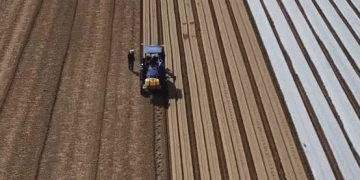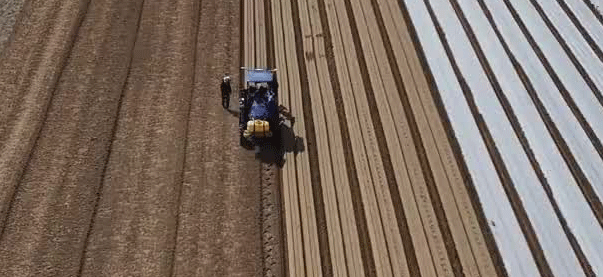As spring unfolds in the Loess Plateau of northern China, Jingbian County in Shaanxi Province is pioneering a new era of agricultural modernization. In Zhaoshuyaoze Village, a 500-mu (33-hectare) carrot farm is showcasing what might be the future of root crop farming in China: full automation, from ridging and mulching to precision seeding and fertigation—all orchestrated by intelligent machines.
The results are striking. Automated machinery enables planting on 100 mu (6.7 hectares) per day, a rate ten times faster than manual labor, while improving land-use efficiency by 20%. Jingbian now boasts over 100,000 mu (6,700 hectares) of carrots under cultivation, with annual output reaching 500,000 tons. Of this, 40% of the cultivated area is managed using intelligent agricultural equipment, including drone-based crop protection and integrated smart irrigation-fertilization systems.
This “Jingbian Model” has allowed the region to transform what was once traditional farmland into a hub of digitally-enabled precision agriculture. The carrots produced here are not only sold in more than 30 Chinese cities via cold chain logistics, but are also exported to international markets, enhancing the county’s reputation for high-quality, traceable produce.
Industry Context and Comparisons
China’s broader carrot production in 2023 reached over 19 million tons, making it the world’s top producer. Yet, Jingbian stands out through its integration of technology, which aligns with China’s national rural revitalization strategy. According to the Ministry of Agriculture and Rural Affairs, increasing mechanization and smart farming adoption are key to boosting both yield and quality—goals Jingbian is already achieving.
While many regions in China still rely on semi-manual processes for root crops, Jingbian’s deployment of unmanned planting drones, GPS-guided seeders, and IoT-enabled fertigation systems offers a replicable blueprint for other regions seeking to modernize.
Jingbian County’s carrot farms are no longer just a symbol of seasonal agriculture—they represent the convergence of tradition and innovation. By embedding automation into the very soil of the Loess Plateau, Jingbian is demonstrating how smart technology can drive rural prosperity, improve resource use, and enhance global market competitiveness. As demand for reliable, high-quality vegetables grows, this model may well lead the way for agricultural regions across China and beyond.































